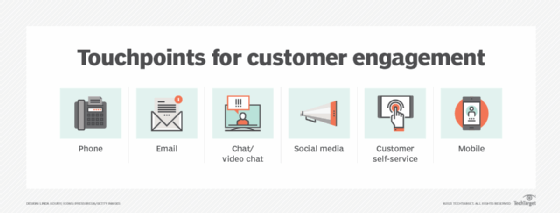What is a customer service manager? Roles and responsibilities
Customer service managers are an integral part of contact centers. They are the team leaders, trainers and policymakers.
A customer service manager executes the organizational strategy to support and resolve customer issues and questions.
In addition to addressing customer inquiries, the customer service manager also provides feedback to the organization and identifies opportunities to improve business practices and overall operations. People who have worked in call centers, retail or other customer-centric jobs could become a customer service manager, if they so choose.
What is a customer service manager?
A customer service manager executes an organization's customer contact strategy and leads a team of people who respond to inquiries from prospective, current and past customers.
Alternative titles for a customer service manager include contact center manager, call center manager, customer support manager, etc. Regardless of the title, the individual in this role must be both a leader and a doer.
From a leadership perspective, a customer service manager must lead a team to resolve customer issues efficiently and expediently. Additionally, a manager must provide insights to other business leaders regarding common pain points that ultimately lead to poor CX.
Occasionally, customer service managers must interact with customers who aren't satisfied with a proposed resolution or deserve an outcome outside of normal policy and procedure. They may also need to analyze data to determine why specific KPIs or other key goals are not met.
Customer service manager job description
Candidates for a customer service manager role usually respond to an internal or external job posting. The posting should provide background on the organization, job summary, compensation and benefits, work schedule and location, the application process and a job description.
The job description is usually split into two categories: roles, duties and responsibilities, as well as qualifications and job requirements.
Roles, duties and responsibilities
Some of the key duties and responsibilities of a customer service manager are the following:
- Supervise customer service team. For supervisory duties, the customer service manager should coach, train and motivate staff. Customer service managers should also create an environment where employees feel valuable.
- Respond to customer inquiries. People contact customer service teams when they have questions about products or services. Staff may interact with customers across several channels, including phone, email and chat. Customer service managers must ensure responses are accurate and provided in a timely manner, regardless of the channel.
- Develop policies and procedures. Policies and procedures make up the customer service rep's playbook to resolve customer inquiries. These guidelines should satisfy customer needs and support the organization's goals. They require constant review and revision as customer needs change and the business evolves. With policies and procedures in place, customer service managers can establish processes and workflows to support those guidelines.
- Focus on customer satisfaction. Customer satisfaction requires service managers to address customer pain points, adjust policies and procedures, properly train agents, measure customer satisfaction and respond to customer feedback. Higher satisfaction can lead to increased spending, higher customer retention rates and favorable referrals. While customers may not always get the response they want, managers must ensure they receive the message. If possible, they should also provide alternative options to the customer.
- Hire staff. Customer service agents need the right personality and tools to interact with customers, and the customer service manager works with the HR team to find qualified candidates. During the hiring process, managers assess whether a candidate has the skills to succeed in the role, including technical competency, problem-solving and communication skills.
- Train staff. New hires and current employees alike require training to succeed in their roles. Trainings for new and veteran agents may include classroom lectures, role-playing and interactive videos. Ongoing training is just as important as training at the time of hiring, as it provides employees with the opportunity to undertake new roles and responsibilities.
- Develop goals and report progress. Customer service agents can monitor and report on various contact center metrics, but they should instead determine the most important metrics for the organization and create goals and objectives around them. Additionally, managers should regularly report on progress toward goals at the individual, team and department levels.
- Continue to learn and grow. The practices and tools that support customer service are constantly evolving. Managers should constantly read articles, participate in webinars and attend conferences to stay up to date on technology changes and practices.

Qualifications and job requirements
Key qualifications and requirements for a customer service manager include the following:
- Previous related work experience. The customer service manager position is not entry-level, so it requires previous experience interacting with customers and leading a team of employees. This does not mean the individual must have worked in a customer service organization in the past. People with retail backgrounds who regularly interact with customers likely have these -- or related -- foundational experiences.
- Strong communication skills. Successful leaders can communicate with team members across a variety of media. Leaders must share and receive information, which requires strong verbal and written communication skills. The customer service manager also must adjust communications for their target audiences -- whether internal or external, formal or informal.
- Strong leadership skills. The customer service manager works with people with different needs, which requires previous experience as a team lead and various leadership skills. They must create an environment and reward system that can motivate a diverse group of employees to perform at their peak.
- Strong analytical skills. The customer service manager must analyze information from both external -- e.g., customer satisfaction surveys -- and internal -- e.g., call statistics -- sources to identify and resolve operational gaps and proactively improve operations.
- Proficiency with customer service software and basic office tools. Much of the software used in customer service teams can help provide structure, organization and communication with staff. The customer service manager must be comfortable with tools such as contact center software, workforce management software, email and messaging apps.
With the growth of hybrid and remote work environments, the modern customer service manager must perform all the above functions in both in-person and remote environments to succeed.
Additionally, job descriptions often don't include specific attributes that a successful customer service manager needs to lead their teams. They must be energetic and passionate about service, freely reward employees for excellence, provide structured feedback when needed, advocate for both customers and team members, and provide hard messages to executive leadership.
How to become a customer service manager
If an individual wants to become a customer service manager, they can do the following:
- Work in a call or contact center. This can include working as a customer service representative, whether in an entry-level, supervisory or support role -- e.g., trainer -- depending on the individual's previous work experience.
- Continue formal education. This includes taking classes to improve critical skill sets a customer service manager needs, such as communications, leadership, etc.
- Attend customer service conferences. Conferences help service managers learn more about contact centers and network with others in various contact center roles.
- Participate in webinars. Many vendors and analyst firms in the contact center space offer webinars that cover a broad range of topics, including technology, workforce management, agent engagement, etc.
- Obtain certifications. Certifications, like those for workforce management, represent the mastery of skill sets that successful customer service managers require.
- Read literature related to contact center operations. Customer service managers can find a significant amount of literature on both general leadership skills and specific contact center topics.
What are the salary expectations for customer service managers?
Customer service managers' salaries vary widely. Many factors contribute to these ranges, including the organization's size, location, prior experience and industry.
The following are examples of the salary ranges reported for customer service managers in the U.S.:
- Payscale shows a salary range of $45,000 to $93,000, with an average salary of $65,519.
- ZipRecruiter shows a salary range of $24,500 to $101,000, with an average salary of $57,988.
- Indeed shows a salary range of $42,505 to $98,978, with an average salary of $64,862.
- Salary.com shows a salary range of $79,467 to $130,609, with an average salary of $103,251.
In addition to these base salaries, many positions may offer bonuses and other benefits or incentives.
What makes a good customer service manager?
Customer service managers need diverse skill sets to successfully lead a customer service organization. These managers must be organizational leaders who can motivate team members and lead the organization to identify and implement strategic objectives that reduce customer and employee pain points, while driving efficiency.
Even though they have a manager title, customer service managers must be able to roll up their sleeves to help solve problems, whether to handle an escalated customer issue or analyze staff to determine why service metrics haven't been met.
There is no optimal career path to become a successful customer service manager. In some cases, a successful manager may rise through the ranks from representative to manager. In other cases, the organization may bring a manager in from another company to gain an external perspective.
Regardless of the path taken, the customer service manager role contains challenges and many rewards, including satisfying customers.
Editor's note: This was originally published in 2021 and updated to reflect changes in customer service.
Scott Sachs is president and founder of SJS Solutions, a consultancy that specializes in contact center strategy assessments and technology selection.








